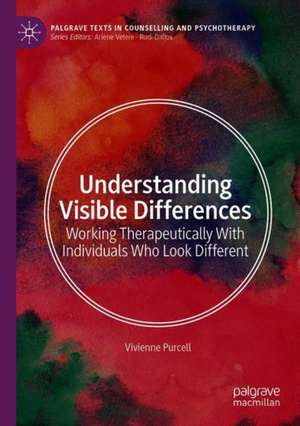Understanding Visible Differences: Working Therapeutically With Individuals Who Look Different: Palgrave Texts in Counselling and Psychotherapy
Autor Vivienne Purcellen Limba Engleză Paperback – 26 noi 2020
Visible difference is a bigger cause of mental distress than is often realised. One in five people have an appearance that is considered ‘different’ to the normal population. The category of ‘visible difference’, previously described as ‘disfigurement’ or simply ‘disability’ captures a range of conditions with varying aetiology, severity, and extent. Differences in appearance can be the result of a birth anomaly, or be caused later in life through illness, physical trauma, or behaviour. Whatever the cause, visible difference can have a negative effect on how individuals are perceived and view themselves.
This timely work arrives at a moment of rising professional interest, due to the growth of social media use and the focus this puts on appearance (“the amplification of appearance bias”), and also influenced by the implications new research. The author draws on these findings together with her own research and practice to examine best practice and key issues in addressing visible difference. Particular consideration is given to establishing a good working therapeutic relationship. Whether a trainee, a recently qualified therapist, or an experienced professional wanting to broaden their understanding, this is the ideal text for anyone wanting to better understand this growing area of therapeutic practice.
Preț: 414.04 lei
Nou
Puncte Express: 621
Preț estimativ în valută:
79.22€ • 82.94$ • 65.55£
79.22€ • 82.94$ • 65.55£
Carte tipărită la comandă
Livrare economică 07-21 aprilie
Preluare comenzi: 021 569.72.76
Specificații
ISBN-13: 9783030516543
ISBN-10: 3030516547
Pagini: 174
Ilustrații: XVII, 179 p. 5 illus., 4 illus. in color.
Dimensiuni: 148 x 210 x 15 mm
Greutate: 0.25 kg
Ediția:1st ed. 2020
Editura: Springer International Publishing
Colecția Palgrave Macmillan
Seria Palgrave Texts in Counselling and Psychotherapy
Locul publicării:Cham, Switzerland
ISBN-10: 3030516547
Pagini: 174
Ilustrații: XVII, 179 p. 5 illus., 4 illus. in color.
Dimensiuni: 148 x 210 x 15 mm
Greutate: 0.25 kg
Ediția:1st ed. 2020
Editura: Springer International Publishing
Colecția Palgrave Macmillan
Seria Palgrave Texts in Counselling and Psychotherapy
Locul publicării:Cham, Switzerland
Cuprins
1.What do we mean by ‘Visible Difference’?.- 2.The Social Construction of Difference and Disability.- 3.The Developing Self - the differences of difference.- 4.The Family Context.- 5. Relationships -Outside of the Family Group.- 6. Assessment and Treatment Planning.- 7. Healing Conversations.- 8. Thinking about treatment plans and models : a formulation- based approach
Notă biografică
Vivienne Purcell was born with a visible difference. She has been a Chartered Counselling Psychologist for more than 25 years. During that time, she worked as Head of the University of Reading Counselling Service, UK and as a Clinical Supervisor in both Oxfordshire NHS Adult Mental Health Service and Central and North West London NHS. She now lives in Hampshire with a private practice, and volunteers for HArt, a local arts and mental health organisation.
Textul de pe ultima copertă
This book provides an evidence-based guide to working with visible difference in therapeutic practice. It explores how appearance problems intersect with other concerns causing mental health issues and provides clear guidance on treatment plans and related topics.
Visible difference is a bigger cause of mental distress than is often realised. One in five people have an appearance that is considered ‘different’ to the normal population. The category of ‘visible difference’, previously described as ‘disfigurement’ or simply ‘disability’ captures a range of conditions with varying aetiology, severity, and extent. Differences in appearance can be the result of a birth anomaly, or be caused later in life through illness, physical trauma, or behaviour. Whatever the cause, visible difference can have a negative effect on how individuals are perceived and view themselves.
This timely work arrives at a moment of rising professional interest, due to the growth of social media use and the focus this puts on appearance (“the amplification of appearance bias”), and also influenced by the implications new research. The author draws on these findings together with her own research and practice to examine best practice and key issues in addressing visible difference. Particular consideration is given to establishing a good working therapeutic relationship. Whether a trainee, a recently qualified therapist, or an experienced professional wanting to broaden their understanding, this is the ideal text for anyone wanting to better understand this growing area of therapeutic practice.
Visible difference is a bigger cause of mental distress than is often realised. One in five people have an appearance that is considered ‘different’ to the normal population. The category of ‘visible difference’, previously described as ‘disfigurement’ or simply ‘disability’ captures a range of conditions with varying aetiology, severity, and extent. Differences in appearance can be the result of a birth anomaly, or be caused later in life through illness, physical trauma, or behaviour. Whatever the cause, visible difference can have a negative effect on how individuals are perceived and view themselves.
This timely work arrives at a moment of rising professional interest, due to the growth of social media use and the focus this puts on appearance (“the amplification of appearance bias”), and also influenced by the implications new research. The author draws on these findings together with her own research and practice to examine best practice and key issues in addressing visible difference. Particular consideration is given to establishing a good working therapeutic relationship. Whether a trainee, a recently qualified therapist, or an experienced professional wanting to broaden their understanding, this is the ideal text for anyone wanting to better understand this growing area of therapeutic practice.
Caracteristici
Provides a guide to working with visible difference in therapeutic practice Includes outlines of general treatment plans for readers to follow or adapt to their own practice Features interviews of people who experience visible differences and have undergone therapeutic treatment to anchor content to real life













